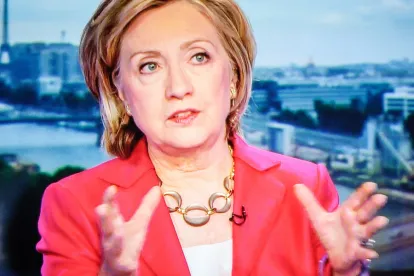On Monday, October 3, 2016, Hillary Clinton issued a statement on her website titled “Hillary Clinton’s Vision for an Economy Where our Businesses, our Workers, and Our Consumers Grow and Prosper Together.”
Prior to this statement, there had been some speculation over what a Clinton presidency might bring in terms of antitrust enforcement.
Unlike President Barack Obama, former Secretary Clinton had not issued a clear policy statement on her antitrust position before Monday. She had, however, penned one short op-ed piece for Quartz, and had made some general statements on the campaign trail regarding the problems of industry consolidation. It was unclear from these prior statements whether a Clinton administration would mean any change in the current state of affairs at Department of Justice (DOJ) Antitrust Division and the Federal Trade Commission (FTC). The current administration has challenged a higher percentage of mergers than any administration since before Reagan’s, but it has not significantly altered the law regarding what mergers are considered actionable.
In her Quartz op-ed, Secretary Clinton stated that “we need to fix [the system],” and decried the concentrated markets in the pharmaceutical, airline and telecommunications industries. But Secretary Clinton gave only two concrete examples of how she would “take on the fight” against “large corporations.”
First, Secretary Clinton stated she “will empower the Department of Justice to vigorously investigate proposed health insurance mergers and take action to reign in prescription drug and out-of-pocket costs.” With regard to health insurance mergers, the DOJ already is challenging vigorously the Anthem-Cigna and Aetna-Humana mergers, and in general investigates the health care industry more often than any other industry. She also criticized “pay-for-delay” agreements in which pharmaceutical companies enter into settlements with generic drug companies to keep the less-expensive generic option off the market. The FTC already challenges these agreements, and has described them as “anticompetitive deals [that] cost consumers and taxpayers $3.5 billion in higher drug costs every year.” Those statements did not indicate a marked policy change from the current administration.
Second, Secretary Clinton said that she would like more staff for the DOJ and FTC. This is a budget issue that would need to pass Congress. Depending on how things shake out in November, it is not altogether impossible, but one hates to rely on anything that requires Congress to take action.
Secretary Clinton’s new policy statement, however, does suggest the potential for even more aggressive enforcement than the current administration. The Obama administration has increased merger challenges and used its authority to prevent or restructure deals. A Clinton administration may do more. Secretary Clinton’s statement indicates that she is worried that increased consolidation is leading to anticompetitive conduct, and the agencies need heightened vigilance.
Secretary Clinton vows to “[a]gressively enforce and strengthen merger reviews as well as our antitrust laws and guidelines;” specifically, to ensure “that mergers and acquisitions do not excessively concentrate market power . . . through higher prices, reduced choice, and other harms.” The statement goes on to say that “large firms abuse their power by excluding potential rivals.”
These statements sound more similar to statements made by Senator Elizabeth Warren (D-MA) than Secretary Clinton’s prior op-ed or the current administration’s policy. Senator Warren said in an antitrust speech in June that she wants the antitrust laws to be used not only to challenge illegal agreements, mergers and other forms of industry consolidation, but to break up companies that already have merged or consolidated. In short, she wants to revive trust-busting. Senator Warren also stated that mergers should be stopped altogether rather than allowed to proceed with conditions or after divestitures.
Although Secretary Clinton did not advocate breaking up companies, she did propose greater emphasis on retrospective review of mergers to examine the impact of mergers “on competition, prices, and other factors,” as well as studies “on market concentration and its impact on competition.” This type of information gathering is already conducted by the FTC and DOJ, but Secretary Clinton appears to be suggesting that greater resources would be devoted to retrospective studies. At the very least, increased emphasis on information gathering would provide the FTC and DOJ a better understanding of how these transactions impacted competition and could lead to more aggressive future enforcement on the basis of these studies’ findings. Greater retrospective review will entail increased post‑transactional costs for companies engaging in acquisitions, as consolidators would be targets for follow-up information requests. Finally, it is possible that more regular and extensive retrospective merger studies could lead to instances where a previously cleared merger could receive additional scrutiny and result in post-merger conditions or requirements placed on the consolidated entity.
Secretary Clinton also vowed on Monday to “[a]ppoint strong leadership at our antitrust agencies.” She will have the opportunity to nominate individuals to fill the two existing Commissioner vacancies as well as a third person to replace current Chairwoman Edith Ramirez whose seven-year term expires in April 2017. Because no more than three FTC Commissioners can be of the same political party and because Commissioners Maureen Ohlhausen and Terrell McSweeny are a Republican and Democrat, respectively, Secretary Clinton will be able to appoint two Democrats and one Republican Commissioner. By filling these vacancies, Secretary Clinton will be able to shape the FTC’s future policy and goals, and direct the FTC to challenge consolidation in general.
Secretary Clinton also will be able to shape future antitrust policy through her choice of Attorney General and Assistant Attorney General for the DOJ’s Antitrust Division. If the Democrats win enough Senate seats in November to ensure a majority without Senator Warren, then Senator Warren could be one possibility to lead the DOJ and influence antitrust enforcement goals (If Senator Warren were to leave the Senate for a position in a Clinton Administration, Massachusetts Governor Charlie Baker (R) would have the chance to appoint someone to fill her seat until the next election, and presumably he would choose an individual of his own party).
As Senator Warren said in her antitrust speech, “the Obama administration has challenged a higher percentage of mergers than any administration since before Reagan’s.” We can expect this trend to continue under a Clinton administration. What remains to be seen is whether a Clinton administration will move to break up companies and industries that have already consolidated, prevent more mergers from proceeding, with or without divestitures, or encourage a revision of the Guidelines that will challenge consolidation more broadly. Any of these things would mean a change in the status quo. Those invested in the antitrust world should pay close attention to who Secretary Clinton appoints to head enforcement agencies should she win in November, and be prepared for more comprehensive challenges to industry consolidation and increased retrospective review.




 />i
/>i

